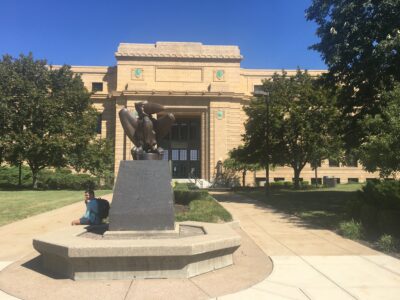KU faculty expressing concern about possible cutting of degrees; Board of Regents to consider statewide review of degrees

photo by: Kim Callahan/Journal-World
Strong Hall on the University of Kansas campus is pictured in September 2021.
KU leaders are considering cutting dozens of programs and degrees — including several in the arts and humanities — as budget challenges persist, and soon the Kansas Board of Regents may start its own degree-cutting process.
The Board of Regents, at its meeting on Wednesday, will consider approving a contract with the rpk Group, a business and education consulting firm, that would review degrees and classes across the state’s university system.
That group already is working for the University of Kansas, and leaders and faculty on the Lawrence campus are at odds on proposed program cuts, which would include the elimination of multiple humanities degrees and a pair of degrees to train art educators, among others.
“Of course we need to be efficient, and at the end of the day you have to pay your bills,” Rémy Lequesne, president of KU Faculty Senate, told the Journal-World. “The faculty understands that, but there are reasons to teach certain topics that go beyond economics. There are reasons to teach art and music and other things that may not make dollars-and-cents sense, but they enrich us and are worth investing in.”
Lequesne said he’s uncertain that the system rpk Group uses to analyze programs and degrees accounts for “contributions other than financial, and that is a concern to me.” Members of the Board of Regents will receive a presentation from the consulting group on Wednesday and are expected to have discussions about how to move forward with reviewing degree programs across the state.
At KU, the process has created disagreement between the University Senate and the provost’s office. Lequesne said the University Senate was asked to consider 42 degrees and programs that had been targeted for possible discontinuation. As part of the process, an academic committee and the University Senate must make recommendations on any discontinuation of degrees.
The University Senate and the academic committee agreed that 28 degrees and programs should be discontinued, in large part because they were inactive or had very minimal levels of activity. But the academic committee and University Senate did not recommend the other 14 programs be discontinued.
Lequesne on Tuesday told the Journal-World that KU Provost Barbara Bichelmeyer is moving forward with discontinuing 12 of those 14 programs, and she hasn’t yet made a decision on the other two programs.
The provost’s recommendations require approval from Chancellor Douglas Girod, at which point the discontinuations become final. Lequesne said the provost’s decision to move ahead with so many discontinuations that didn’t have the support of the university’s faculty was disconcerting, given that the process is designed to give the academic community a strong voice in such decisions.
“Reasonable people can disagree, but in this case, overruling the University Senate so consistently is very disturbing to many of us,” Lequesne said.
The Journal-World reached out to the provost’s office in early February and again on Tuesday for comment and further details on the process of discontinuing degrees and programs, but did not receive additional information or comment.
Bichelmeyer did briefly address the process as part of a University Senate meeting earlier this month. She said some discontinued programs could be morphed into other degree programs. She also said she would be talking with faculty members of some of the impacted degrees, especially in the humanities.
Bichelmeyer’s recommendations include eliminating the bachelor of arts degree in humanities, the minor in humanities, the minor in peace and conflict studies, and the graduate certificate program in peace and conflict studies.
“I do believe in the importance of the humanities,” Bichelmeyer told University Senate at its Feb. 3 meeting.
Lequesne said the potential elimination of the humanities programs had drawn a lot of attention from faculty leaders because it was unclear how KU was going to incorporate those disciplines into other academic programs.
The possible elimination of two arts programs also is attracting attention. Bichelmeyer is still considering whether to recommend to the chancellor that KU discontinue its bachelor’s and master’s degrees in visual art education. Those programs are the ones commonly used to train art educators. The University Senate expressed concern that the elimination of those degrees could harm the entire Department of Visual Art at KU because the visual art education degrees are the largest degrees in terms of students in the department.
Other degrees that the University Senate has objected to discontinuing but that are currently among those recommended by the provost to be discontinued include: a Ph.D. in gerontology; a master’s in East Asian Studies; and bachelor’s and master’s degrees in Latin American and Caribbean Studies. KU has articulated ideas on how to incorporate those degrees into other programs in the university.
But Lequesne said the university has not provided any real estimates on how much the discontinuance of degrees and programs will save the university. He said eliminating a program or degree is not the same as eliminating an entire department. Thus, eliminating degrees doesn’t always result in much in the way of personnel or other savings, he said.
“It doesn’t necessarily lead to any cost savings,” he said. “It just reduces the options our students have.”
The Journal-World’s efforts to get a cost savings estimate from KU related to the discontinued degrees hasn’t been successful.







